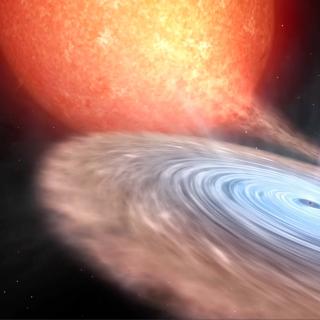Bibcode
Shahbaz, T.; Linares, M.; Breton, R. P.
Referencia bibliográfica
Monthly Notices of the Royal Astronomical Society, Volume 472, Issue 4, p.4287-4296
Fecha de publicación:
12
2017
Número de citas
26
Número de citas referidas
23
Descripción
Linares et al. obtained quasi-simultaneous g΄-,
r΄- and i΄-band light curves and an
absorption-line radial velocity curve of the secondary star in the
redback system 3FGL J0212.1+5320. The light curves showed two maxima and
minima primarily due to the secondary star's ellipsoidal modulation, but
with unequal maxima and minima. We fit these light curves and radial
velocities with our X-ray binary model including either a dark
solar-type star spot or a hotspot due to off-centre heating from an
intrabinary shock to account for the unequal maxima. Both models give a
radial velocity semi-amplitude and rotational broadening that agree with
the observations. The observed secondary star's effective temperature is
best matched with the value obtained using the hotspot model, which
gives a neutron star and secondary star mass of M1 = 1.85
^{+0.32}_{-0.26} M⊙ and M2 = 0.50
^{+0.22}_{-0.19} M⊙, respectively.
Proyectos relacionados

Agujeros negros, estrellas de neutrones, enanas blancas y su entorno local
Los agujeros negros y estrellas de neutrones en binarias de rayos-X son laboratorios únicos para explorar la física de estos objetos compactos. No solo permiten confirmar la existencia de agujeros negros de origen estelar a través de mediciones dinámicas de sus masas, sino que también permiten investigar el comportamiento de la materia y la
Montserrat
Armas Padilla